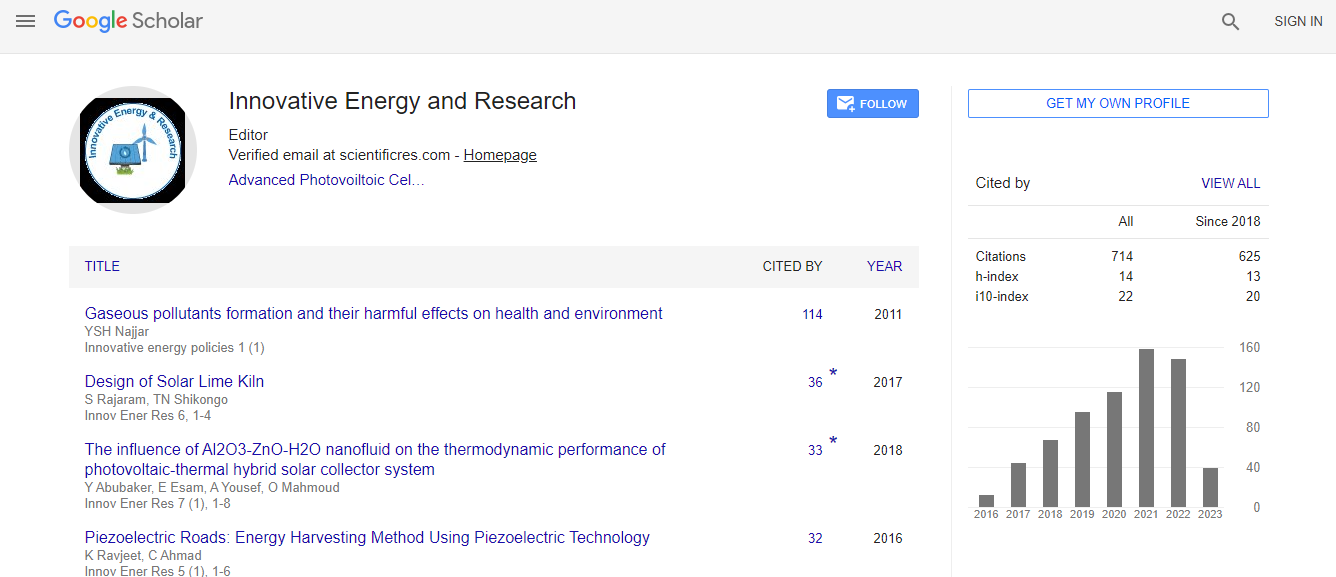Our Group organises 3000+ Global Conferenceseries Events every year across USA, Europe & Asia with support from 1000 more scientific Societies and Publishes 700+ Open Access Journals which contains over 50000 eminent personalities, reputed scientists as editorial board members.
Open Access Journals gaining more Readers and Citations
700 Journals and 15,000,000 Readers Each Journal is getting 25,000+ Readers
Google Scholar citation report
Citations : 712
Innovative Energy & Research received 712 citations as per Google Scholar report
Innovative Energy & Research peer review process verified at publons
Indexed In
- Google Scholar
- Open J Gate
- Genamics JournalSeek
- RefSeek
- Hamdard University
- EBSCO A-Z
- Publons
- Euro Pub
- ICMJE
Useful Links
Recommended Journals
Related Subjects
Share This Page
Laser processing of thermoelectric oxides
20th International Conference on Advanced Energy Materials and Research
N M Ferreira, M A Madre, A Sotelo, A V Kovalevsky and F M Costa
Universidade de Aveiro, PortugalICMA, CSIC-Universidad de Zaragoza, Spain
ScientificTracks Abstracts: Innov Ener Res
Abstract
Ceramic oxides are very promising materials for thermoelectric devices, as they exhibit high Seebeck coefficient and could present relatively low electrical resistivity, as well as high chemical stability at high temperatures. Several oxides exhibit anisotropic thermoelectric properties linked to their layered structures. Therefore, texturing methods developing a preferential grain orientation, like the directional growth from the melt, are suitable to enhance the relevant physical properties. These methods have already shown their applicability to this kind of compounds and also in high Tc superconductor materials, namely, through the use of laser floating zone (LFZ) technique. The LFZ process has demonstrated its suitability for the Co-oxide based thermoelectric materials, processed in the last years in our laboratories. In this work, some examples of the versatility and usefulness of the LFZ technique are shown. The LFZ technique allows obtaining very dense, homogeneous and well textured thermoelectric composites. The results put in evidence an improvement due to electrically assisted laser floating zone on the thermoelectric performances when compared with materials processed by LFZ and by conventional techniques. Recent Publications 1. A V Kovalevsky, A Myriam, S Populoh, S Patrício, N M Ferreira, S Mikhalev, D Fagg, A Weidenkaff and J R Frade (2016) Designing strontium titanate-based thermo electrics: An insight into defect chemistry mechanisms. Journal of Materials Chemistry A 5:3909-3922. 2. A Sotelo, F M Costa, N M Ferreira, A Kovalevsky, M C Ferro, V S Amaral, J S Amaral, S Rasekh, M A Torres, M A Madre and J C Diez (2016) Tailoring Ca3Co4O9 microstructure and performances using a transient liquid phase sintering additive. Journal of the European Ceramic Society 36(4):1025-1032. 3. M A Madre, F M Costa, N M Ferreira, S I R Costa, S Rasekh, M A Torres, J C Diez, V S Amaral, J S Amaral and A Sotelo (2016) High thermoelectric performance in Bi2-xPbxBa2CO2Ox promoted by directional growth and annealing. Journal of the European Ceramic Society 36(1):67-74. 4. Rasekh, F M Costa, N M Ferreira, M A Torres, M A Madre, J C Diez and A Sotelo (2015) Use of laser technology to produce high thermoelectric performances in Bi2Sr2Co1.8Ox. Materials and Design 75:143–148. 5. F M Costa, N M Ferreira, S Rasekh, A J S Fernandes, M A Torres, M A Madre, J C Diez and A Sotelo (2015) Very large superconducting currents induced by growth tailoring. Crystal Growth and Design 15(5):2094–2101.Biography
N M Ferreira is a PhD in Physics Engineering (2014), currently is a Post-Doc Researcher at i3N, Physics Department and CICECO, Department of Materials and Ceramic Engineering at University of Aveiro, Portugal. He participated as a collaborator and research fellow in several R&D projects on material science. He is an experienced researcher in study and development of ceramics-based materials, prepared through conventional methods (melting, solid stated), with particular focus on laser processing (crystal growth – LFZ and surface sintering). Present sample characterization skills include various techniques such as, electrical conductivity and magnetic properties of various oxide materials. Current focus materials: thermoelectrics, ferroelectrics and glass matrices doped with transition metals and rare earth for energy storage and conversion applications. Main expertise is related to structural, magnetic and electrical properties of materials prepared by laser processing.
E-mail: nmferreira@ua.pt

 Spanish
Spanish  Chinese
Chinese  Russian
Russian  German
German  French
French  Japanese
Japanese  Portuguese
Portuguese  Hindi
Hindi 
